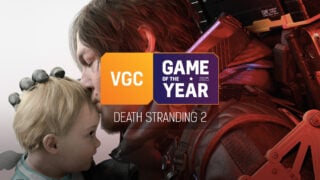BitSummit day two: Hotel Barcelona, Devolver’s Forestrike and a stretchy sea cucumber
More hands-on impressions from Japan’s indie festival

The second day of BitSummit has now ended, and we’ve got another set of hands-on impressions for you.
Japan’s leading indie game festival is bigger than ever before this year, with an even wider variety of games from all over the world.
For the first time in BitSummit’s history the event has taken over both floors of the Miyako Messe venue in Kyoto, a clear sign of its continued growth and success.
Part of this success is down to the expert curation of the games on offer at the show, which may go some way to explaining that for the second day in a row, none of the games I played were bad.
Here’s a rundown of what was played today, and here’s the day one roundup if you missed it.
Tensei
I first played Tensei at last year’s BitSummit when it was still in a fairly early state.
It’s now available on Steam for a very reasonable £2.49, and is coming to consoles on August 8.
The game has you playing as a little black blob, and the aim is simply to ascend as high as possible by jumping across a series of pillars floating in the air.
The blob can do a triple-jump, and can also perform a ground-pound to make it easier to land on small columns.
While at its core it’s a very simple concept, the game is beautifully designed, with a striking art style.
This time I managed to get high enough to change the season too, turning everything to springtime with sakura petals and the like.
If you want a game that’s both challenging and relaxing at the same time, I absolutely recommend Tensei.
Fowl Damage
May Gardens was one of the developers who worked on the wonderful Peglin (a cross between Peggle and a turn-based RPG), and now she’s got this fun solo project.
Fowl Damage is a 2D platformer in which you play as an egg. Yes, very old players like me may be thinking of the Dizzy games, but this is nothing like the classic Codemasters series.
Your egg has a single jump height, and it’s (deliberately) far too high. Stand still and tap the jump button – no matter how lightly – and the egg will leap into the air, then smash into pieces upon landing.
The aim, then, is to find platforms that are just high enough to jump onto without falling too much – and, likewise, when you need to descend you’ll need to find platforms you can safely drop onto without breaking the egg.
The result is a game that, while simple in its concept, does a surprisingly good job of making you completely rethink the way you play platformers, with each jump now requiring some thought and planning.
Just when you think you’ve got the hang of it too, a big crushing device suddenly starts slamming in from the side of the screen, forcing you to think on your toes and start jumping quicker. The whole thing’s brilliant.
A demo for Fowl Damage is available on Steam now if you fancy trying it out.
JDM: Japanese Drift Master
As the name suggests, Japanese Drift Master is all about powersliding cars around tracks.
The demo I played maybe didn’t show the game in the strongest light: it offered a single lap around a track, and appeared to be running on a Steam Deck or ROG Ally plugged into a monitor.
The former means I didn’t have enough time to get used to the handling (which obviously takes longer for a game where drifting is the focus). By the time I’d finally gotten to grips with it I was only one or two turns away from the finish line.
The latter, meanwhile, appeared to be causing some performance issues with a frame rate and graphical fidelity that’s nothing like the trailer you can see above.
Despite all this, I still enjoyed what I played, and I’m hopeful that when the free Prologue is released on August 8 it’ll let players experience the game in the way it was intended.
(Also, the guy working the booth gave the player next to me a big keyring thing for playing the game but didn’t give me one, which is frankly outrageous. Doesn’t he know who I think I am?)
Forestrike
Only just announced yesterday by Devolver Digital, Forestrike has a big presence at BitSummit with a large booth showing off the game’s artwork.
It’s a game about fighting groups of enemies in increasingly complicated set-ups, and figuring out the best sequence of moves you’ll need to defeat them.
You only get one life in this game, so if you die it’s right back to the start for you. The twist is in the title (sort of), because your character has the power of foresight.
Before each fight you get to use foresight instead and act out the fight in your head to figure out what to do. Each fight is a sort of puzzle, because different enemies require different techniques and the order you take them on is important.
Do you sidestep that charging opponent on the right first and get him to plough into the other guy, stunning them both? Or do you take out the guy on the left first and use his weapon to take out the charging enemy? Obviously, it gets more complicated each time.
You can practice foresight as many times as you like until you find a sequence of events that works, but you’ll need to make sure you have it nailed and watertight, because when you choose to have the actual fight, you only get one chance to pull it off correctly.
I really enjoyed this one – it can take a while to figure out more complicated fights but once you find a sequence that works then pull it off in the main fight, it feels like you’re the star in a well choreographed martial arts movie.
It’s being described as a roguelite and I suppose it is in a sense, because when you die the abilities you gained are carried with you through your next playthrough. It’s a pretty loose use of the term, though. Don’t worry about what box it fits into: it’s fun.
Into the Dead: Our Darkest Days
The first two Into the Dead games, created by New Zealand studio PikPok, were first-person endless runners where you have to get as far as possible while dodging and shooting an infinite horde of oncoming zombies.
Our Darkest Days is a spin-off that takes things in a completely different direction – quite literally – and I really enjoyed what I played of it.
Set in Texas in 1980, the game ditches the endless running first-person viewpoint for a slower side-scrolling survival adventure reminiscent of the Xbox 360 game Deadlight (and I’m sure other things, but that’s the first that came to mind).
You choose from a group of survivors, each with their own strengths, and explore a variety of locations – a creepy house, a creepy police station, a creepy school – to carry out a series of tasks.
The atmosphere in this one is brilliant and the combat is satisfying, giving you a chance against one or two zombies but forcing you to run like hell and hide for cover when a group forms.
This has the potential to offer something special when it’s out next year. Fingers crossed it nails the landing.
Re:VER Project Tokyo
Seemingly a while away from release, Re:VER Project Tokyo is a collaboration between indie developer Nestopi and Toei Animation.
Set in modern day Tokyo but using pixel art, the game has you playing as a chap called Yukinori Amane, who’s been falsely accused of a crime he didn’t commit (the prologue shows him meeting the real killer, who runs off before they’re revealed).
The aim is not only to find out the identity of the real killer, but to do it before the police manage to track you down and arrest you.
The gimmick here is that the police don’t appear to be 100% certain who you are either, so at the top corner of the screen is an ‘investigation progress’ percentage that keeps rising as you do things in public that make other citizens suspicious.
While you have limited to time to do certain things, then – in the demo you have to find parts for a console and repair it so you can exchange it for an antidote for your sick friend – you can’t just run everywhere because other people on the streets will wonder what’s so urgent.
The same goes with rummaging in the bins – you need to do it to find the items you need (as well as survival items like food, water and medicine) but you have to do it discreetly or citizens will get suspicious and the police investigation meter will rise.
I’m curious about this one, it’s a strong start.
Hotel Barcelona
No More Heroes creator Suda51 and Deadly Premonition creator Swery65 first said they wanted to make Hotel Barcelona back in 2019, and half a decade later it’s finally playable.
The game is a 2.5D hack and slash game where you play as Justine, a federal marshal with a serial killer living inside of her. You have to fight through seven stages, each inspired by a different slasher movie.
The level I played was Slasher Slugger, which is clearly based on Friday the 13th, given its summer camp setting, its crazy old man warning of a death curse, and the main villain who’s obviously based on Jason (albeit with a penchant for baseball instead of hockey).
While the game initially appears to be a straightforward hack and slash affair, the gimmick comes when you die and start the stage again.
On your second playthrough, your previous playthrough appears as a sort of ghost and all the actions you performed are carried out again as you run alongside them. In this way, if you’re lucky enough (or skilful enough, I suppose) your spectre can damage enemies or draw their attention away from you.
I only managed to get about 10 minutes with Hotel Barcelona but as a big fan of slasher movies the game’s vibe has me keen to play more. I like what I’ve seen so far.
Chinana Go!
The award for silliest game of the day has to go to Chinana Go!, a game made by three students from the Game Creator department of Japan College of Engineering.
The game stars a sea cucumber who wants to become the ultimate sea cucumber in the ocean. It’s played with only one button and a stick: you hold the button to stretch, and use the stick to move around.
The aim is to eat as much fish as you can until you level up. Once you do this you get to choose from a selection of special outfits which give you abilities (faster speed, more stamina etc).
Levelling up also lets you eat bigger fish, so you have to keep eating progressively bigger fish and putting on even more outfits until you finally reach the surface and eat the whale minding his own business at the top.
Given that it’s a student game and a fairly simple one it’s not really clear whether Chinana Go! will ever get a proper release.
Either way, the trailer above gives a good idea of it, so even if you don’t get to play it you can still see the silliness it embraces.
Cassette Boy
Sadly, this has nothing to do with the UK comedy duo of the same name who make music parodies by mashing up soundbites from politicians.
Instead, it’s a puzzle adventure that’s “inspired by quantum mechanics”, which is a wildly bold way of saying it’s about making things disappear by hiding them behind objects.
Although the game initially looks like something you’d see on the Game Boy, by pressing the L or R buttons you can rotate the screen 45 degrees, showing that it is in fact a fully 3D world.
By rotating the camera and changing the perspective, things that can no longer be seen no longer exist. Is there an object in your way? Turn the camera until a tree is in front of it, then you can easily walk behind the tree, with no object there.
Is there a floor switch that opens a door, but closes it again when you step off it? Step on the switch, turn the screen to make it disappear and the door stays open.
It’s a fun gimmick and one that will no doubt lead to headaches later on. If you want to see its main mechanic for yourself there’s a demo currently available on Steam.
That’s all for our day 2 coverage from BitSummit.
We’ll be back tomorrow with our final day of hands-on impressions, followed by our Game of the Show pick.



